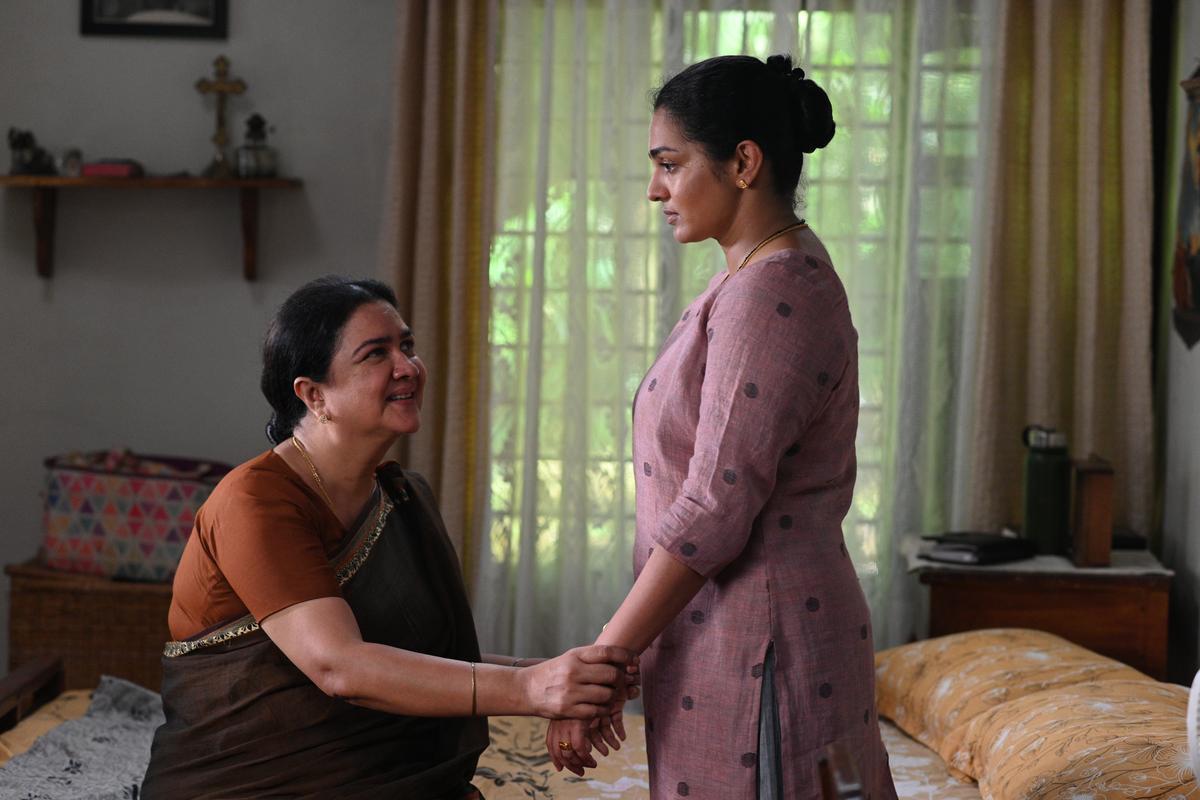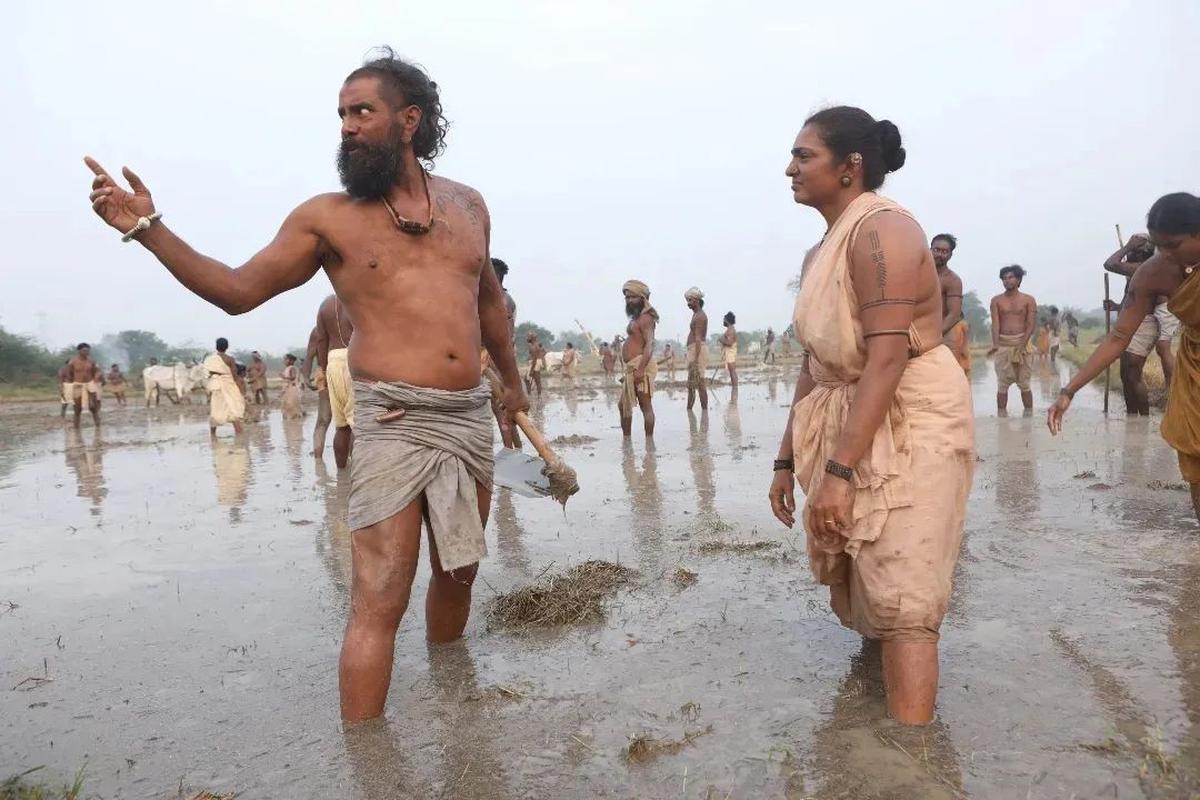[ad_1]
After a lull, Parvathy Thiruvothu is ruling the screen with three back-to-back releases, Ullozhukku, ‘Kazhcha’ in Manorathangal and Thangalaan. Recently, she won Best Performance (Female) at the Indian Film Festival of Melbourne for bringing alive Anju in Christo Tomy’s Ullozhukku.
Speaking to The Hindu from Melbourne, Parvathy that says every award that she wins for Ullozhukku, it is going to be for Anju and Leelamma (Urvashi). “For me, Ullozhukku is a story of beautiful friendships. They are on the same boat, these two characters, metaphorically and physically, towards the end of the film. Every award for Anju or Leelamma is for both of them. This one is for all of us — for Christo, for RSVP Movies who were brave enough to produce the film and market it so beautifully. We all know how important it is for producers to show such faith in a film.”
Excerpts from a conversation…
What was it like to play Anju?
Every day was steeped in such uncertainty. Though I had an amazing co-actor with me, a brilliant director and a great art department, the world of Anju itself was so slippery. Her presence, in those few days when we see Anju, only shows how suffocated and pushed to a corner she already was with the choices she had made. When we meet Anju for the first time, it is not the beginning of the struggle. We are meeting her bang in the middle of it. It is like she is on an island, surrounded by water and the water is closing in on her. And then you realise that Leelamma is also on an island and the water is closing in on both of them.
So, each day, I went to the set knowing that I would fail. I felt I had no idea what I was doing and I would not get it right. I just wanted to understand one day at a time, one moment at a time, one scene at a time and if I get it right, what a relief! Each day was like that. And the understanding that I went with was the fact that she was resolute about finding a way out, no matter how pushed to a corner she was. She was resolute in the fact that her relationship with Rajeev [Arjun Radhakrishnan] was not vilified; she was certain she had given her all to her marriage.
Finally, I figured a way out and then it was about negotiating her way out of that. Every day, I had to speak up for her. In my head, I would say ‘I have got your back girl. I am going to be there to embody you’. In hindsight, I realise that was the route I was taking.

Urvashi and Parvathy in a still from ‘Ullozhukku’
How important are awards to an actor and to you?
I am not sure if awards have a role in me taking on a character. Accepting any role depends on whether it tugs at the heartstrings, whether it tugs at the actor in me who is so excited about the craft of it. And I do not think about how it is going to come about eventually or whether it will be critically acclaimed or commercially successful. That is not my struggle. Unless and until I am part producer,I don’t think I should be involved in it.
But when I do end up getting an award like this, I get the stage to talk about things that are important to me. If I get a world forum like IFFM and if I cannot talk about the plight of women right now, I don’t think I can sleep well at night. I use every opportunity I get when I am being celebrated or my craft is being celebrated. Gratefully, I would like to remind all of us that we cannot be tone-deaf, we have to stay alert. As actors, even though we have a stage all the time and a social media presence, when an award is bestowed on you, it is a crucial point, it is a stage where no one can turn their head away, it is not a reel or a post where anyone can swipe by. You can make a plea to your fellow artistes to make better choices and to remind yourself to do the same.
How difficult was the dialect and portraying your character in ‘Thangalaan’?
Gangamma is being loved so much. The glee it gives me surpasses everything. I wake up to people tagging me on their stories and I get deeply felt, long messages, and not just about Gangamma but also about Sudhakutty (from ‘Kazhcha’ in Manorathangal, directed by Shyamaprasad). Both of them have resonanted with viewers. I am grateful that after a period of three years, when all these films are coming around at the same time, people are able to take in Anju, Gangamma and Sudha. As an actor, I think it is a lucky stroke that all are appreciated.
With Gangamma, the dialogue was close to impossible. Even the Tamil-speaking actors, including Vikram, found it so difficult to get it correct. And it was all sync sound. I remember crying myself to sleep for many days thinking I had botched it up. All of us actors had huddled together and given each other group hugs. Then the master craftsman Pa Ranjith would finally say, ‘ok, you got it right’. There were times when we did 19 to 20 takes for one scene. At one point, I was drinking pre-workout drinks to keep my energy up. We would not be able to dish out that energy by the time we reached the 20th take. There is a lot of physical and mental toil that went behind it. It is so gratifying to hear everyone say that the dialect has come out well, that they can’t see Parvathy, only Gangamma.
Did you have a language coach to help you get the right nuances?
We didn’t have a language coach. But we had the most amazing associates – Anbu and Bala. They deserve all the accolades we are getting for the dialogues. They were so patient and they would send me voice notes. So, for me, it was a four-tier process. Every morning, while the tattoo and the make-upweres being done, he wouldsendt me a voice note in one speed, then in the slowest speed. They he would come and sit with me while I wrote it in English and keep repeating it until I heard, That is right’. However, all that effort would dissipate in front of the camera when Ranjith would go and change the dialogue! I would be aghast. But at no point did I see Anbu and Bala wincing or complaining. They were so dedicated and involved in their craft. I learned from them not to complain and look forward to the next challenge. Towards the end, when I began to get some of it right, Anbu told tell me, ‘you are getting there, you are getting it right’. I felt like I had graduated.
Does the costume and make-up play a part in helping you get into the skin of a character?
On every movie, the alankar part of it was the first point of entry for me on a film set, not prior to it or when I am preparing for the role. We might go back to our room, deal with personal things. In the morning, after a cup of coffee, when the make-up team (big shout-out to them) starts their work, that is when I shut off everything and enter a meditative space. They also understand what I am doing. Sometimes, we listen to rap music and so on. But when they sense I am struggling with dialogues or a difficult scene, and when they start their work, it is not just make-up; it is them doing their art work so beautifully.
The dress I wore and all the women artistes in the movie who did not wear a blouse… It also psychologically affects an actor. And for that, the costume department helped us in many ways to be comfortable. In the film, we are all just flying about. No one is just walking along in a composed way; we are jumping, running, with arms flailing about. Just getting comfortable in that costume was a journey.

Vikram and Parvathy on the sets of ‘Thangalaan’
Did you do a lot of reading to play Gangamma, given that the film talks about the politics of caste, gender, land and so on?
I did do my research but most of the research came from Ranjith’s team. They had done extensive work and I trusted them. They are from a community that has experienced (what the movie talks about). Secondly, for someone who has been born into a community that has to carry the guilt and shame of what the oppressive community has done, it was almost like getting a kind of permission from them that I can play thtois part. I needed that. Ranjith selecting me for the role meant a lot to me. That is his faith in me to do justice to Gangamma. I had reservations which I had shared with Ranjith. He assured me that it was his choice and that is what made it different. So I trusted the research they had done.
Moreover, there was so little research on women of that time. There was almost nothing written about them, nothing much to go by. We had a deep dive on set building Gangamma, Aarathi and Arasani. There was so much we had to build on the set.
And the sequel?
I have no clue. I got to know about it only when they announced it. I have no official confirmation about that. But let’s hope Gangamma is part of that.
What are currently working on in Malayalam cinema?
There are many projects that I can’t talk about. But I can tell you that the diversity of genres I am getting to act in is interesting. In many interviews, I have been expressing, ‘Please give me some comedy!”’ I am still deliberating and understanding how to go about it. Currently, I am just enjoying this. It is three years of work that is coming out in three months. That is one helluva ride to be on. I am on top of the world!
[ad_2]
Parvathy Thiruvothu interview: on ‘Thangalaan’, awards and portraying Gangamma






